Thailand is known for stunning beaches, vibrant cities, and rich cultural experiences. As tourism grows, sustainable travel practices are crucial. That’s why in this article the Lux Travel DMC team highlights some ideas for getting eco-friendly trips that allow travelers to explore Thailand while minimizing their environmental footprint. These experiences focus on preserving nature, supporting local communities, and promoting conservation, ensuring a positive impact on the destinations you visit.
I. Top Eco-friendly Activities in Thailand | Recommended Trips Ideas
1. Trekking in Northern Thailand
Chiang Mai and Chiang Rai on guided eco-treks that immerse you in Thailand’s rich natural landscapes and diverse cultures. Along the way, you can visit remote hill tribe villages, where you’ll learn about their sustainable farming practices and traditional way of life. These treks not only offer a scenic adventure but also support local communities and preserve cultural heritage.
2. Cycling tour in Aythuthaya or Sukhothai
Ayutthaya and Sukhothai offer glimpses into Thailand’s rich ancient history with their stunning temple ruins. You can Pedal through Thailand’s countryside and explore the ancient ruins of Ayutthaya or Sukhothai on eco-friendly cycling tours. As you ride, enjoy breathtaking views while reducing your carbon footprint and fostering a more sustainable mode of travel. These tours support local communities by encouraging interactions with villagers, providing opportunities to explore local markets, and offering a deeper connection to Thailand’s rich history.
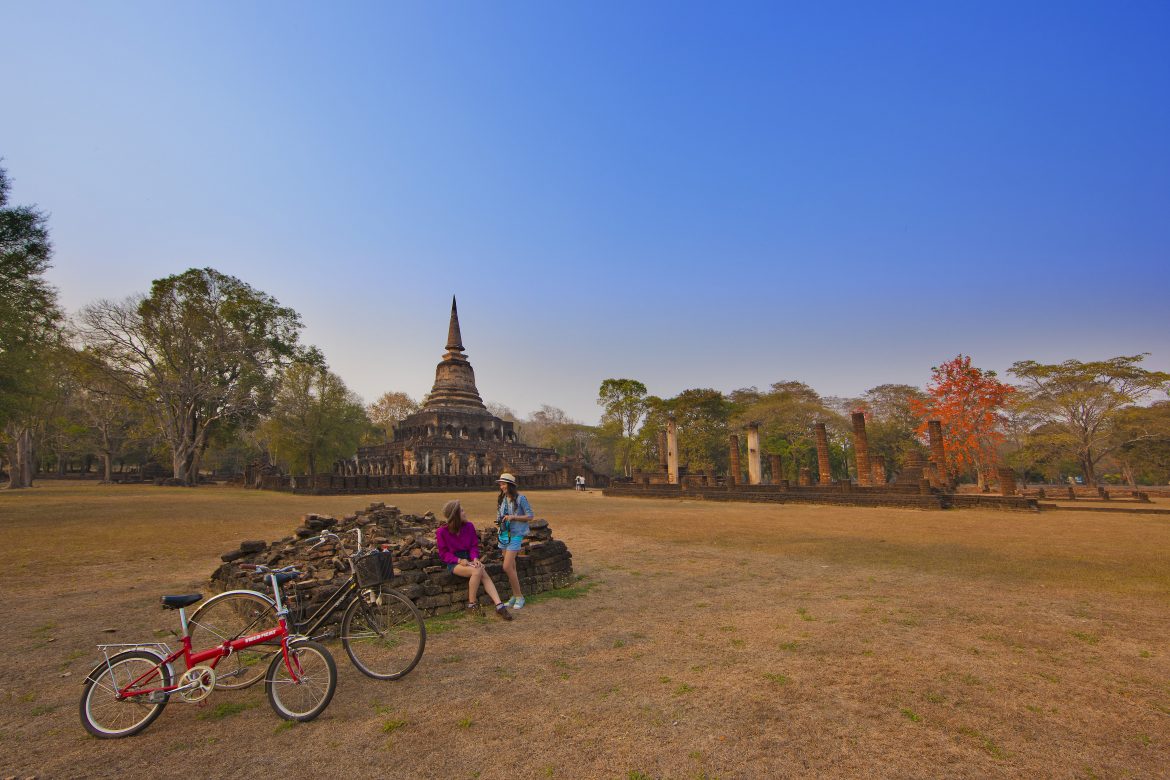
Cycling in Sukhothai, recommended eco-friendly tirps in Thailand
3. Kayaking and Canoeing in Phang Nga Bay
Phang Nga Bay showcases breathtaking limestone cliffs and hidden caves. It’s interesting to paddle through the emerald waters of Phang Nga Bay, navigating through limestone karsts, hidden caves, and mangrove forests. Kayaking and canoeing are environmentally conscious ways to explore Thailand’s breathtaking marine environments while minimizing your impact on the delicate ecosystems. This immersive experience offers close encounters with nature, showcasing the beauty of Thailand’s coastal landscapes in an eco-friendly manner.
4. Volunteer at Elephant Sanctuaries
Travellers can contribute to ethical elephant conservation by volunteering at sanctuaries in Chiang Mai that rescue elephants from harmful conditions. These sanctuaries focus on the well-being of elephants, offering tourists the opportunity to feed, bathe, and care for them in a respectful, ride-free environment. Your visit helps fund conservation efforts while educating visitors on the importance of protecting these magnificent creatures.
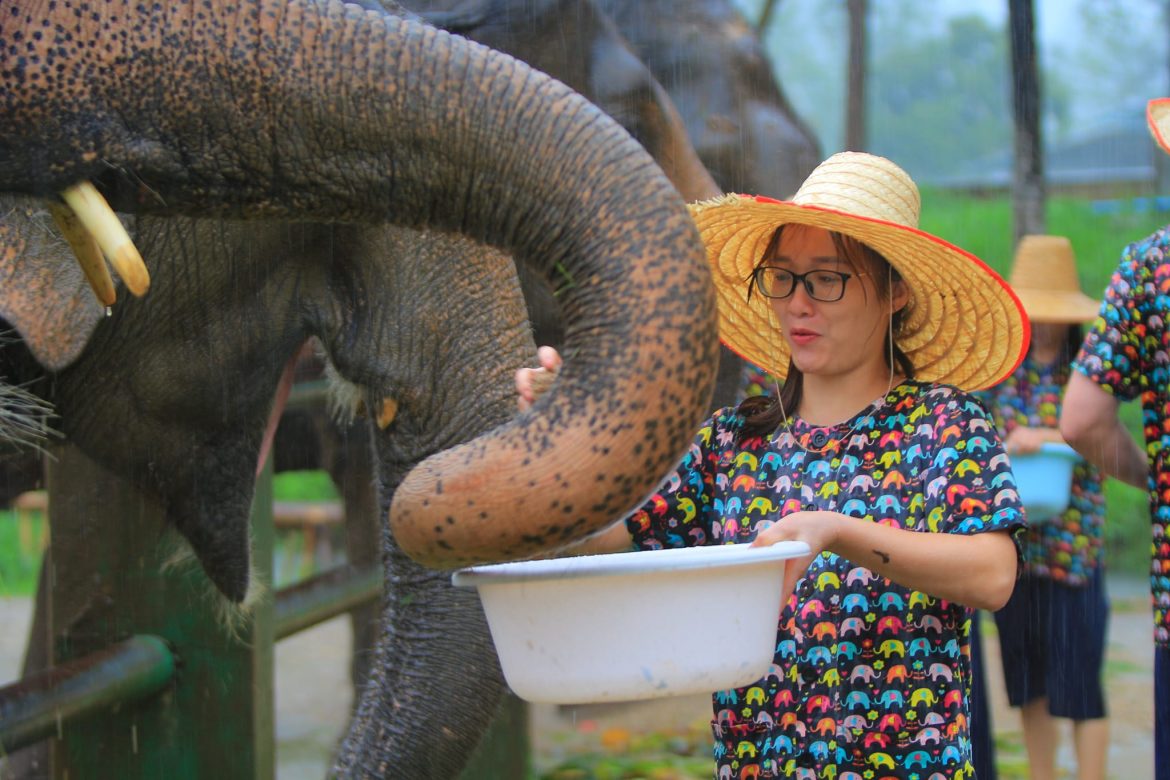
Lux Travel Team bathes elephants in Chiang Mai
5. Poo Poo Paper Experience
It’s very helpful for kids and families to discover the innovative recycling process at the Poo Poo Paper Park in Chiang Mai, where elephant dung is transformed into eco-friendly paper products. This interactive tour not only offers insight into sustainable recycling practices but also supports elephant conservation by promoting the ethical use of natural resources. Visitors can participate in the papermaking process, gaining a unique hands-on experience in sustainable tourism.
6. Birdwatching in Khao Yai National Park
Khao Yai National Park is a UNESCO World Heritage site teeming with diverse wildlife. You can join professional guides on eco-friendly birdwatching tours in Khao Yai National Park. These tours are designed to respect natural habitats while offering you a chance to spot rare species in one of Thailand’s most biodiverse regions. Your participation in these tours supports conservation efforts aimed at preserving the park’s delicate ecosystems.
7. Organic Farm Stays and Cooking Classes
You can immerse yourself in sustainable agriculture by staying on an organic farm in rural Thailand, where you’ll learn first hand about eco-friendly farming techniques. For some activities, you can join such as: farm-to-table cooking classes, and preparing traditional Thai dishes using fresh, organic ingredients grown on-site. This hands-on experience supports local farmers and offers a deeper appreciation for the connection between food, land, and sustainability.

Khao Soi – a traditional curry noodle dish of northern Thai cuisine.
8. Snorkeling and Diving in Marine Protected Areas
Thailand is famous for its many beautiful islands and beaches. You may explore Thailand’s underwater world in marine-protected areas like the Similan and Surin Islands, where vibrant coral reefs and diverse marine life thrive. Eco-conscious snorkeling and diving tours minimize environmental impact by promoting sustainable practices such as avoiding coral contact and protecting marine habitats. These adventures allow you to witness Thailand’s stunning underwater ecosystems while contributing to their preservation.
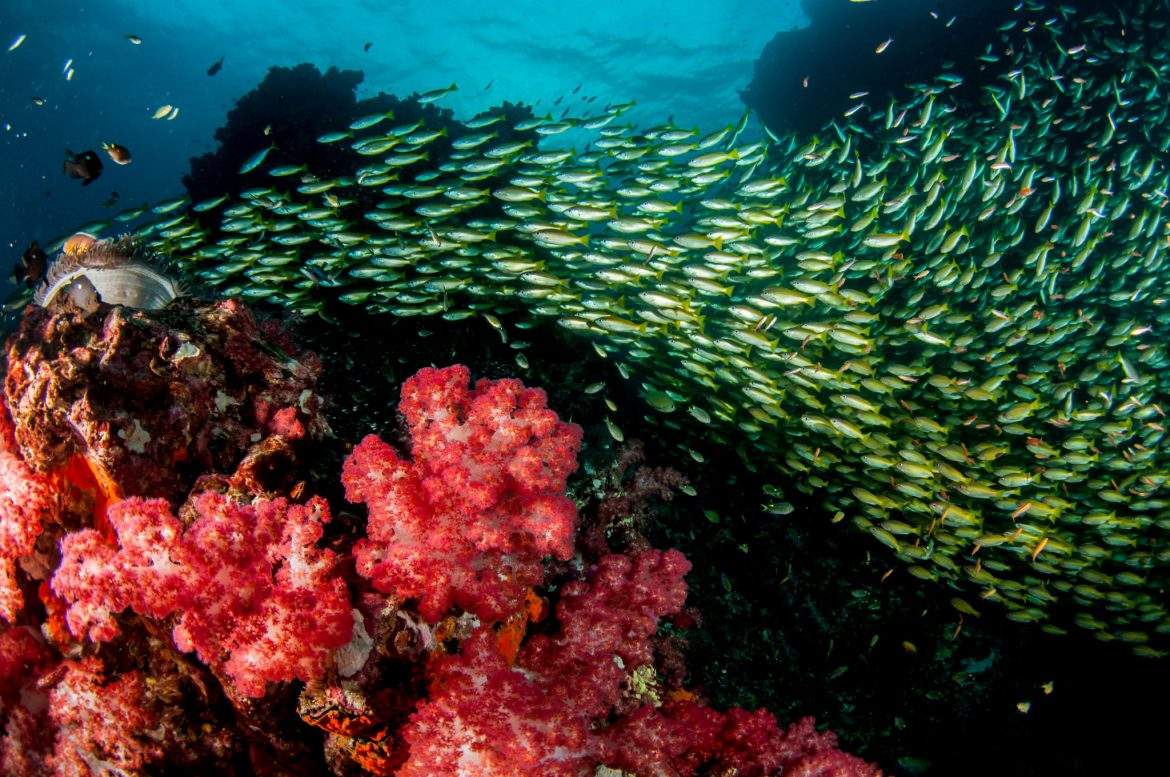
Thailand scuba diving
9. Visit Community-Based Tourism Projects
You can engage with local communities by visiting villages like Ban Mae Kampong, where community-based tourism fosters authentic cultural exchanges. You can learn traditional skills such as bamboo weaving or tea production, while contributing to the local economy and sustainable tourism development. This responsible form of tourism allows visitors to experience local life while ensuring that the benefits remain within the community.
II. Hand-picked sustainable and eco-friendly accommodations
For eco-friendly trips, we suggest choosing sustainable accommodations. Many eco-friendly resorts and hotels are committed to protecting the environment by using renewable energy sources, conserving water, reducing waste, and supporting the local economy. From luxury eco-resorts to small, sustainable homestays, Thailand has plenty of options to ensure your stay is green and guilt-free.
Top eco-friendly stays in Thailand we recommend:
Six Senses Yao Noi (Phang Nga Bay):
Located in Phang Nga Bay, this luxury resort sets an excellent example of sustainability. Six Senses Yao Noi uses solar power, employs water conservation practices and runs several initiatives to protect the local wildlife and environment. They also have a coral rehabilitation program and encourage low-impact activities like kayaking, cycling, and nature treks. The resort offers a luxurious, eco-conscious experience with stunning views of Phang Nga Bay.
Anurak Community Lodge: This eco-lodge is nestled in the heart of Khao Sok National Park. It offers immersive jungle experiences while encouraging guests to minimize their environmental impact. Guests can participate in responsible tours, including hiking and bird-watching while learning about local conservation efforts.
Soneva Kiri (Koh Kood): Soneva Kiri is a luxurious eco-resort on the unspoiled island of Koh Kood. The resort emphasizes sustainability by using renewable energy, reducing plastic waste, and supporting local communities. It features eco-friendly villas made from sustainable materials, an organic garden, and a waste-to-wealth recycling center. Guests can enjoy activities like snorkeling, tree planting, and eco-tours.
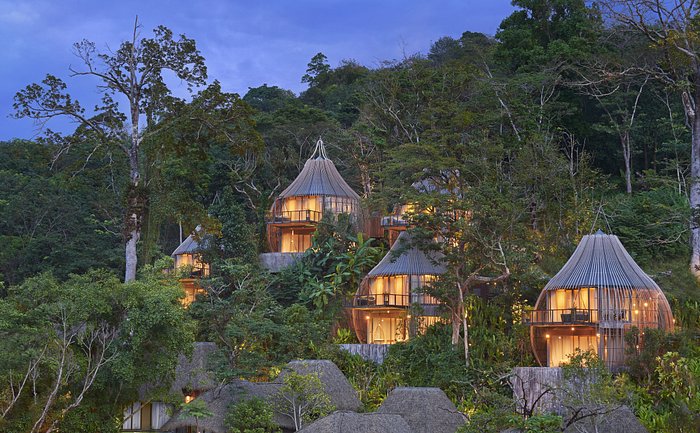
Keemala Phuket Resort
Keemala (Phuket): It is known for its unique “village” of eco-luxury treehouses and pool villas nestled in the rainforest of Phuket. The resort practices sustainable waste management, supports local artisans, and offers organic, farm-to-table dining. Keemala promotes wellness and environmental consciousness through its eco-friendly spa, permaculture garden, and holistic activities like yoga and meditation.
III. Priority for Eco-Friendly Transportation
One of the most impactful choices you can make as a responsible traveler is to reduce your carbon footprint by choosing eco-friendly transportation. Thailand has a robust public transportation network, from buses and trains to tuk-tuks and ferries. In cities like Bangkok, use the BTS Skytrain or MRT subway system to reduce emissions. They’re efficient, cost-effective, and a great way to avoid the infamous Bangkok traffic.
For long-distance travel, opt for trains over domestic flights. The scenic train ride from Bangkok to Chiang Mai offers breathtaking views of the countryside while minimizing your carbon footprint. In smaller towns and islands, rent a bicycle or electric scooter to get around, which is both eco-friendly and a fun way to explore at your own pace. To get eco-friendly trips, we suggest avoiding booking domestic flights unless necessary, as they contribute significantly to carbon emissions.
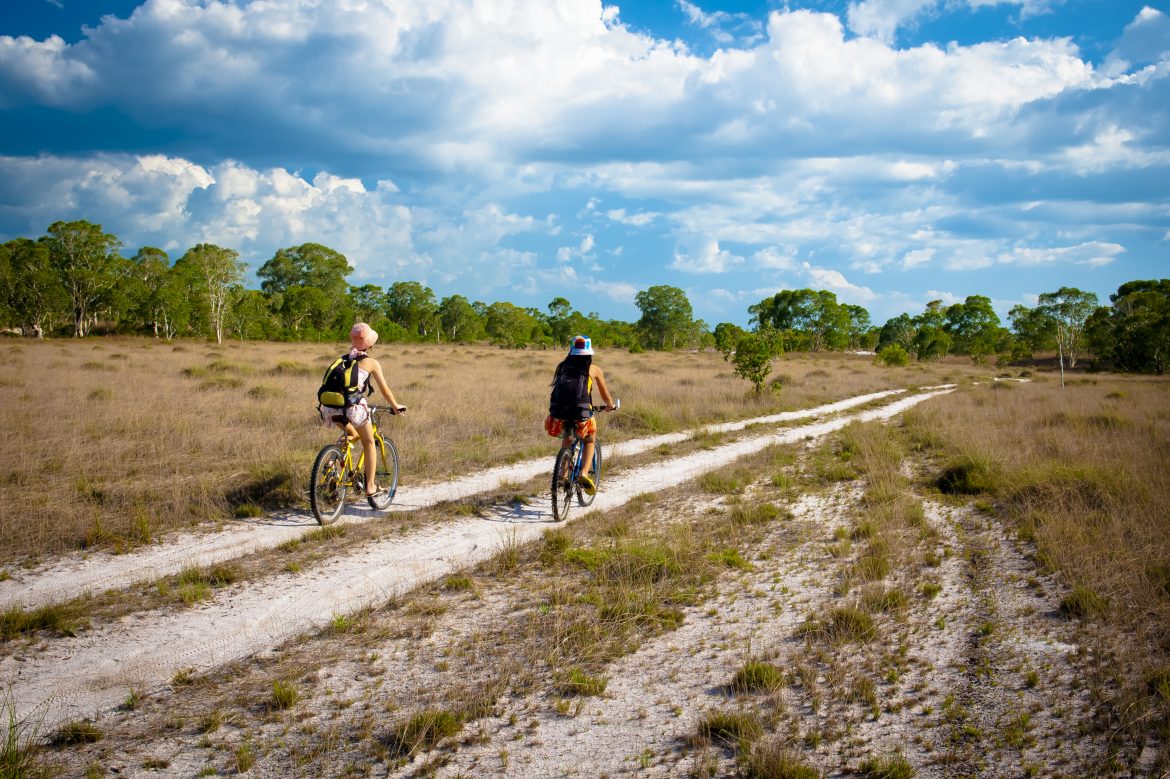
Phang Nga-Mo Ko Ra-Koh Phra Thong Nationl Park
IV. Do not miss Green Souvenirs for Eco-Friendly Trips
Before you leave Thailand, you’ll likely want to bring home some souvenirs. Make sure you’re choosing items that are sustainable and ethically made. You should avoid products made from endangered species or materials that are harmful to the environment, like coral, ivory, or exotic animal skins. We recommend you buy locally-made Thai silk products, supporting artisans in the northern region of Thailand such as: Handcrafted bamboo and wooden items from markets in Chiang Mai. For organic food products, such as herbal teas, coconut oil, and spices, all of which are widely available and make excellent, sustainable gifts.
Eco-friendly Trips are more than just a trend – it is a necessity. By making eco-conscious choices in how you travel, where you stay, and how you interact with Thailand’s culture and environment, you help ensure that this incredible country remains as beautiful and welcoming for future generations of travelers. So pack your bags, plan responsibly, and embark on your eco-friendly adventure in Thailand – a journey that both respects and celebrates this vibrant, culturally rich, and ecologically diverse land.
IV. About Lux Travel DMC
Lux Travel DMC, Asia’s Leading Luxury Tour Operator, proudly became a Travelife Partner in December 2023 and is striving to achieve Travelife certification in 2024. We are committed to advancing sustainable tourism and achieving our “Net Positive” goals by 2030. Our initiatives focus on reducing plastic waste, protecting biodiversity, promoting eco-friendly trips, respecting local cultures, and maintaining transparency. Founded in 2005, Lux Travel DMC specializes in tailor-made tours across Asia and has received numerous prestigious awards.
